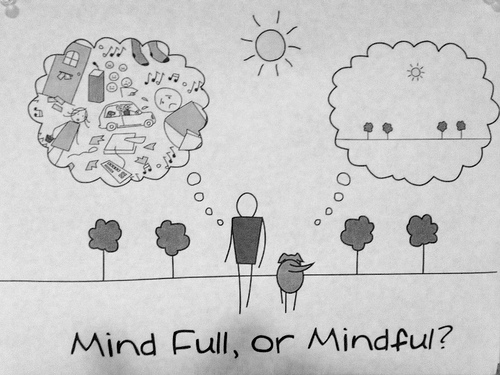Do you:
- Eat your food in a rush, barely chewing
- Mindlessly munch on snacks while zoned out in front of the TV or computer
- Eat because you are in a social setting where everyone else is eating
- Eat until the food in front of you is gone
- Eat because your are upset or bored
- Eat until your hand hits the bottom of the popcorn bucket at the movies
The question quickly turns to: “Do you eat mindlessly?”
Is there a solution? Yes! The practice of mindful eating!

One of the easiest things we can do to promote health is to eat in a calm, mindful manner.
What is Mindful Eating?
Mindful eating is an ancient practice of bringing one’s full attention to all the tastes, smells, colors, textures, temperatures, sounds, thoughts, and feelings that arise around eating and food. It is eating with intention and attention by bringing awareness to our automatic and reactive responses to food. Mindful eating is not just about paying attention, but paying attention without judgment.
Through the practice of mindful eating you can learn to experience the natural joy of eating, develop a more compassionate attitude toward your body, and quiet your critical mind.
Is there a Benefit?
Some of the benefits of mindful eating include reduced occurrences of over eating, increased enjoyment of food, improved digestion, and being satisfied with less.
Other benefits may include:
- Increased self-esteem and acceptance
- Increased confidence and ability to reach your goals
- Tools for living a healthier life and losing weight
- Insight into patterns and habits that lead to poor health and overweight
- Increased awareness of what you experience in your body, thoughts and feelings
- Help in recognizing and handling stress and your reactions to it
Ready to Try?
Now that you know what mindful eating is and the benefits, you may be wondering how to incorporate mindful eating practices into your daily life. Here are my 8 simple steps to mindful eating.
#1. Rate your hunger before you eat
Take a few moments to recognize whether you are physiologically hungry before you begin eating. If you aren’t hungry or if a craving doesn’t come from hunger, eating will never satisfy it. It is often hard to determine “why” we have the urge to eat. Is it emotional? Does it look visually appealing? Is everyone else doing it? Pausing for a mindful moment to evaluate where the hunger is stemming from. Is it emotional, environmental, social, triggered by sight, sound, or smell, or actual hunger? Evaluating your hunger prior to eating can help to reduce emotional eating and guilt. It is also important to keep your body adequately fed to avoid becoming overly hungry which increases the chance of overeating.
#2. Choose food that will satisfy both your body and mind
In a society obsessed with eating right and the latest fad diet, it is easy to get caught up in the hype. Sometimes we eat foods that we don’t like, because we think it is the “right” way of eating. However, there’s a catch. Satisfaction comes not just from fullness, but also from enjoying the taste of food without guilt. Eat only what you really enjoy.
#3. Sit down
Set the table in a pleasant manner even if you are dining alone. Create a relaxing, pleasant ambience so your meal can be enjoyable and satisfying. Designate eating areas at home and at work that are only used for eating. When at home only eat at the table. This habit will help to minimize mindless snacking and allow you to give the food your full attention. Eat when sitting down, not while standing over the sink, peering into the refrigerator, standing in front of the pantry, or sitting in bed. Eating while sitting allows you to focus on the food in front of you for both pleasure and nutritional value.
#4. Eat without distractions and stop multi-tasking
Distractions significantly prompt mindless eating. It is really difficult to focus on eating if you are doing other things. If you eat while distracted by watching television, driving, or talking on the phone, you won’t be giving your food or your body’s signals your full attention. As a result, you may feel full but not satisfied or may end up mindless overeating resulting in discomfort. Put away the cell phones and turn off computers and the television. Let the meal be a relaxing time of nourishment for the body and soul.
#5. Eat like a Foodie
Savor the aromas and tastes of your food as you eat it. Appreciate the occasion, the atmosphere, the company, or simply the fact that you’re giving yourself the opportunity to sit down and enjoy your meal. Talk and share! Turn the focus of the conversation onto the meal while you are eating. Share what you are experiencing in terms of flavors and textures, likes and dislikes.
#6. Slow Down
Take a few breaths and center yourself before you begin eating. Bring your mind back to the present moment. Breathe in through the nose, out through the mouth to settle the body. This will help you slow down and give eating your full attention. Other ways to help you slow down include putting your fork down between bites, eating with your non-dominant hand, or sipping water between bites. When we eat quickly, there is no time for our taste buds and sense of smell to get maximum flavors and pleasure from food. By eating slowly and paying attention, we get greater satisfaction from all meals and snacks.
#7. Pause
Pause in the middle of eating for at least two full minutes. Estimate how much more food it will take to fill you to comfortable satiety. This will allow you to eat with intention. When you feel satisfied push your plate forward or get up from the table. Keep in mind that you’ll eat again when you’re hungry.
#8. Notice how you feel when you’re finished eating
If you overate, don’t punish yourself, but learn from the experience. To break patterns, we first have to be aware of their existence. Be aware of the physical and/or emotional discomfort that often accompanies being overly full and create a plan to decrease the likelihood that you’ll overeat in the future.
Old habits die hard. It may be challenging to practice mindful eating within your hectic lifestyle, especially if you are always on the run. Don’t try to make drastic changes. Lasting change takes time, and is built on many small changes. Start by choosing one meal or snack per day to eat mindfully.



